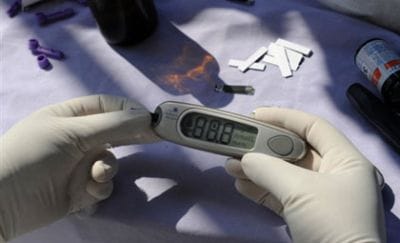Protect our future

Diabetes is a group of metabolic diseases, clinically known as Diabetes Mellitus, in which a person has high blood sugar, either because the body does not produce enough insulin, or because cells do not respond to the insulin that is produced. Glucose is vital to human health because it is the main source of energy for the cells that make up muscles and tissues. This high blood sugar produces the classical symptoms of urination, increased thirst and increased hunger. If anyone has diabetes, no matter what type, it means he has too much glucose in his blood -- although the reasons may differ -- which can lead to serious health problems.
There are three main types of diabetes: Type 1 diabetes -- insulin-dependent diabetes mellitus (IDDM) -- results from the body's failure to produce insulin, and presently requires the person to inject insulin. Type 2 diabetes results from insulin resistance, a condition in which cells fail to use insulin properly, sometimes combined with an absolute insulin deficiency. Gestational diabetes is when pregnant women, who have never had diabetes before, have high blood glucose level during pregnancy. It may precede development of Type 2 DM.
All forms of diabetes have been treatable since insulin became available in 1921, and Type 2 diabetes may be controlled with medication. Adequate treatment of diabetes is thus important, as well as blood pressure control and lifestyle factors such as smoking cessation and maintaining a healthy body weight.
People all over the world, especially in developing countries, have the impression that diabetes is a disease of the rich. That is not the case. Diabetes is rising faster in developing countries like Bangladesh. There are many reasons for the increase, but a key reason is that lifestyles are changing faster in developing countries.
This change is related to urbanisation and globalisation. One can't stop it, it is part of civilisation. What is of concern is that with this increased urbanisation people are getting less physical exercise. Even if they want to exercise, there's less space to do that. Workplaces, schools and colleges have few or no facilities for physical activity.
Diabetes has come a long way in terms of public awareness, particularly since the 2006 UN "World Diabetes Day" Resolution. World Diabetes Day became an official United Nations Day with the passage of United Nation Resolution 61/225 proposed by Bangladesh. Bangladesh Diabetic Samity (BADAS) backed the government of Bangladesh, and was instrumental in campaigning for this resolution to draw attention to issues of paramount importance to the diabetes world and keep diabetes firmly in the public spotlight.
This year's World Diabetes Day campaign is a worldwide clarion call to action to protect the health of our future generations. The campaign aims to convey the urgency with which the diabetes epidemic must be approached. The WDD 2012 campaign marks the fourth year of the International Diabetes Federation's five-year focus on "Diabetes education and prevention."
Following the United Nations Summit on Non-Communicable Diseases (NCD) in 2011, governments must continue to strengthen the momentum generated by the event and widen the awareness of the factors responsible for the global diabetes and NCD epidemic. They must also identify solutions that are required to counter it. On this premise, the WDD focus has been placed on highlighting the importance of education -- for health professionals, people with diabetes and people at risk -- in reducing the impact of diabetes throughout the world. The campaign aims to educate, engage and empower youth and the general public on diabetes. The slogan chosen for the campaign is "Diabetes: Protect our Future."
The 2012 campaign puts special focus on children and young people as the driving force for the promotion of education and prevention messages. It has been revealed through recent researches that Type 2 diabetes can be prevented through healthy eating and physical activity. In this context, the young people should be inspired, local communities engaged, and governments should recognise the importance of early awareness of the risks and dangers of this serious and deadly disease The three key messages of this year's campaign are: (a) Access to essential education for everyone; (b) The way of living is putting human health at risk; (c) People with diabetes face stigma and discrimination
Uniquely for a global campaign of any kind, WDD exposes and explains the links between the risk factors for diabetes and the worsening state of the planet's health. Even more importantly, WDD focuses on the ways in which health-protective behavioural changes, from the individual to the multinational/corporation level, will help
protect the future of individuals, communities and, indeed, an entire species.
In the fight against discrimination, the International Diabetic Federation launched the first ever International Charter of Rights and Responsibilities of People with Diabetes in 2011: a balance between rights and duties to optimise health and quality of life; to enable as normal a life as possible; and to reduce/eliminate the barriers which deny realisation of full potential as members of the society. It is extremely frustrating to suffer blanket bans, and many examples exist, including insurance, driving licenses, getting a job, keeping a job and family affairs.
We must change the public's approach to food and dietary health, particularly among young people; transform the way people eat by educating children about food; give families the skills and knowledge they need to cook; and motivate people to "stand up for their right to better food." It's crucial for children to learn about food -- where it comes from, how it affects their bodies and how one can cook nutritious meals with fresh ingredients.

 For all latest news, follow The Daily Star's Google News channel.
For all latest news, follow The Daily Star's Google News channel. 



Comments